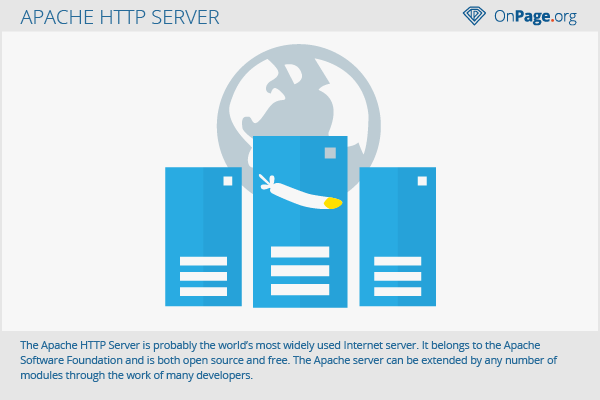Apache HTTP Server
The Apache HTTP Server is probably the world’s most widely used Internet server. It belongs to the Apache Software Foundation and is both open source and free. The Apache server can be extended by any number of modules through the work of many developers. It is especially popular among SEOs because of its mod_rewrite option.
Development
The origins of the Apache HTTP Server go back to 1995 when a group of software developers wanted to optimize existing server software from the University of Illinois in the United States. The improvements focused primarily on “patches.” Separate server software finally emerged from the originally planned fixes. The singular form of this “IT patch-up” according to the legend gave this new product its name “a patch-e,” i.e. Apache. Today, however, it is widely believed that the name Apache was chosen as a form of respect to the American Indian tribe of the same name.
The steady development of the Apache HTTP server software was driven forward by the rising Internet use and dissemination, which caused an increased demand for high-performance server software. The number of developers who dealt with Apache and contributed ideas also increased since the software was open source from the beginning. Finally, the Apache Software Foundation was founded as an independent foundation in 1999.
Origin and compatibility
Just like many developers today, the inventors of the Apache HTTP Server work with UNIX. Thus, the first version was optimized for that platform. Nowadays, the server software is compatible with all major platforms such as Linux or Windows. However, it is recommended to use the Apache HTTP server with Windows versions from NT or later.
To fully exploit the advantages of a particular operating system, version 2.0 of the Apache HTTP Server has been equipped with a special library, the Apache Portable Runtime. Moreover, the new version of Apache has numerous multi-processing modules, which are aligned to the respective strengths of the operating system.
Modules
A great advantage of the Apache HTTP Server is its structure, since it consists of modules. These can be used for many different purposes. Common modules are for example:
- mod_ssl: Connections between the web server and browser can be encrypted.
- mod_headers: With this module, the data in the headers of a website can be changed.
- mod_rewrite: URLs can be manipulated with this.
Other options with an Apache HTTP server
As a server software, the Apache HTTP server has the advantage that websites can be created dynamically. For this purpose, common scripting languages such as PHP or Perl must be used. Furthermore, the Apache HTTP server also supports Python or JavaScript. All these languages are modular in design and can be installed easily and quickly. The advantage of this is that dynamic websites can be created easily by the simple installation of scripting languages.
LAMP, the standard for the Installation of the Apache HTTP server
The LAMP combination is recommended to fully benefit from the Apache HTTP server. It stands for: L for Linux, A for Apache, M for MySQL, and P for PHP.
Apache and SEO
The Apache HTTP server offers many advantages for SEOs. The fact that the mod_rewrite module lets you rewrite static URLs into dynamic ones is one of the biggest benefits. They are often referred to as SEF URLs (search engine friendly).
Redirects such as 301-redirects can be solved using an Apache HTTP server.
Web Links

